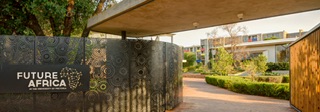The Future Africa Research Leadership Fellowship (FAR-LeaF II) is a two-year research-oriented fellowship programme supported by the Carnegie Corporation of New York and hosted at Future Africa. The programme focuses on future-looking science leadership and developing the next generation of African scientists and academics. The programme seeks to build a network of emerging African scientists with the skills to apply transformative research methods and approaches in addressing complex sustainability challenges in Africa, including inter- and transdisciplinarity, systems thinking, and futures literacy. Furthermore, it will provide multiple research and learning opportunities covering different sectors of science and society, aiming to create sustainable solutions in a real-world context, establishing communities of practice, and addressing the broad scope of the politics of sustainability, resilience, and greater social cohesion.
Applicants should be receptive to applying transdisciplinary science and developing leadership skills to generate positive societal changes whilst striving for a future academic leadership position. Successful applicants to the programme will receive a two-year fellowship, with training on transdisciplinary research approaches, through Future Africa at the University of Pretoria and its partners and inclusive co-design of fellows’ research projects with relevant role-players. The training and support provided by the FAR-LeaF II programme will create opportunities to establish research relationships at diverse African universities in collaboration with and through mentorship opportunities offered by the University of Pretoria.
The FAR-LeaF II programme follows the first FAR-LeaF programme, which supported research focused on sustainability and well-being on the African continent. The research in the FAR-LeaF II programme will extend and build upon the FAR-LeaF research, with an additional focus on the politics of sustainability.
The broad area of the politics of sustainability is focused on interrelated issues such as democracy, public participation and advocacy, governance and societal decision-making, political will, political systems, institutions, policy innovation, and science-policy-practice interfaces. This domain also seeks to understand the tensions within and between local communities, governments, environmental NGOs, etc., arising from the implementation of SDGs.
The Fellowship will support early-career researchers in conducting research projects relevant to the focus areas of the politics of sustainability, resilience, and social cohesion. The research will be conducted in the context of relevant national and regional challenges in sustainable development.
The importance and relevance of sustainability science in Africa is exemplified by the need to:
Advance the development and full integration of the natural sciences with the social and human sciences as a cross-cutting research approach.
Generate actionable knowledge relevant to achieving sustainable development goals in Africa.
Articulate African perspectives on and solutions to global political challenges and opportunities related to achieving these goals and project these into global fora.
The FAR-LeaF II programme will emphasise tangible solutions to these highly complex challenges that have profound implications for research, collaboration, institutional responsibilities, and governance.
